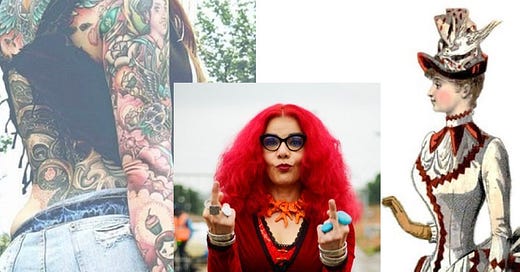Essay: A Vindication of the Demands of Attention Whores
Attention whore.
The combination of that adjective and that noun is as powerful and dangerous as nuclear fusion, a process which, according to the World Nuclear Association, “offers the prospect of an almost inexhaustible source of energy.”
Witness the nuclear explosion in the minds of misogynists when a woman with an opinion tells the world what she thinks. It is powerful and dangerous to be an attention whore. And so we must be attention whores. Let’s blow their fucking minds.
And when I did just that after Prince Philip died, the spectacle of white English people melting down in my Twitter notifications was hysterical and predictable.

But perhaps most predictable were “accusations” that I was an “attention seeker.” This at a time when scenes worthy of a cult of personality around the Duke of Edinburgh were on display in England.
If I’m an “attention seeker,” what do you call a royal family which is worth $88 billion and which has a media team at its disposal that can cajole and manipulate the coverage it wants?
Attention is power. When you command attention, you command power. And so patriarchy has muddied the waters around attention with the word “whore.” Seeking attention is flung as an accusation that is meant to whip shame into you, because to be an “attention seeker” is to be an “attention whore.” A word intended to shame is used to convince women that to want attention is to want something shameful. Much like sex.
Attention, unlike sex, is something that the heteronormative patriarchy has determined that men give--men “pay us” attention-- and women take--women are attention seekers. Men aren’t attention seekers because you can’t seek what you own. Patriarchy socializes men into believing they are entitled to women’s attention and bodies. With sex, men take pleasure, while women give it. When a woman gives sex away too “easily,” she’s a “whore”; when she takes “too much” attention, she’s also a whore--an “attention whore.” Always a whore. Like sex, attention will always be used against you. Maybe it’s because you want the “wrong” kind, or maybe it’s because everything you do is “just for attention.” Always a whore.
There is nothing shameful about wanting attention. There is nothing shameful about wanting sex. There is nothing shameful about sex work. There is nothing shameful about being a whore.
And to be a woman with an opinion--especially a woman who writes and tells the whole world her opinion--well!
Witness the nuclear explosion in the minds of misogynists when a woman with an opinion tells the world what she thinks. It is powerful and dangerous to be an attention whore. And so we must be attention whores. Let’s blow their fucking minds.
Attention is a reward, a burden, a taunt, a taint, an accusation. Attention is a bone that patriarchy dangles in front of women: if we want it too much, we’re whores, if we don’t want attention when it determines we should have it, it stalks us relentlessly until we give in and take it. We can’t win.
And so we should refuse to play.
We should defy and subvert patriarchy’s rules on attention instead. Women are too often assumed to wake up with a single thing on our minds: how can I draw attention to myself? Thus, one of the quickest and most pernicious ways to diminish a woman who is too (fill in the blank: loud, challenging, defiant, disruptive) is to accuse her of “doing it for attention.”
When I was younger, I would vehemently deny that I said or did something for attention. That “accusation” did indeed whip me into shame. But with every lashing, it became apparent that such an “accusation” aims to punish women who speak out, especially if our “attention seeking” directly challenges the patriarchy. Or as I saw this week, challenges the lies white supremacist patriarchy tells about itself and demands we believe, such as calling Philip’s racism and sexism “gaffes” to justify its performative grieving. And ignoring the fact that he sat with the titular head of the worst colonial power in human history. As well as punishing, calling a woman an “attention seeker” for expressing an opinion you want to shut down is meant to undermine her original point, shaming her for speaking then diminishing her intellectual authority.
So, to be clear: I want attention. I deserve attention. My ideas are important and they deserve attention. What I have to say is important and it is worthy of attention.
The most subversive thing a woman can do is to talk about her life as if it really matters, because it does.
Patriarchy uses attention as a reward for those it anoints as worthy. The white, The thin. The cisgendered. The feminine. The able-bodied. When we say “pay attention” we should be cognizant of the aspect of reward at play. Patriarchy pays attention to those who fall within its conventional notions of beauty. Those conventions depend on where you live, but in many parts of the world, for example, due to legacies of white European colonial power and the more contemporary prevalence of Hollywood-produced films in which white supremacy has promoted whiteness as the default and as the beautiful, eurocentric notion of white feminine beauty are paramount.
The converse is true: by withholding attention, by not “paying” it, patriarchy punishes. Attention is withheld from fat women, Femininity in women is rewarded with attention. For transgender women, attention can be a reward and life threatening. The pressure on transgender women to conform to femininity - to pass, to conform to conventional notions of beauty, so that they are rewarded with the “right” kind of attention that admires rather than the wrong kind that is suspicious and violent and punishes their inability to conform. Trans women of colour in the Americas have an average lifespan of 35 years. The less a trans woman “passes,” the more violence she is subjected to.
The further you are from whiteness and thinness, the further from “beautiful” according to patriarchy and its cis-gender standards, the less deserving of attention. Attention is both reward and punishment. It is how patriarchy regulates us.
What would the world look like if we did not wait to be anointed worthy of attention according to patriarchy’s standards? What if we commanded, seized, created attention instead of waited to be “paid” attention?
I have always understood the importance of demanding attention, even if it took me while to say “I fucking deserve attention,” because I see that attention is power, and attention is freedom.
The most subversive thing a woman can do is to talk about her life as if it really matters, because it does.
It is in the name of that subversion, for the sake of defying the patriarchy, that we must declare “I deserve attention,” “I demand attention,” and “My life is important, my views are important, and they deserve attention.” And it is in the name of that subversion and defiance, we must understand why attention is important, why demanding and taking it are important. We must understand the importance and power of being “attention whores.”
What does it mean to snatch attention? To say look at me, when patriarchy does not think you should be seen? It means rendering patriarchy’s power moot.
I have always understood the importance of demanding attention, even if it took me a while to say “I fucking deserve attention,” because I see that attention is power, and attention is freedom.
"A woman who writes has power. A woman who writes is feared. In the eyes of the world this makes us dangerous beasts,” Gloria Anzaldúa
At the age of 16, I vowed I would become a journalist because I wanted to be free. My family had moved to Saudi Arabia from the U.K. in 1982 and I felt like I had been put on trial, found guilty of being a teenage girl and sentenced to life in prison. Being a journalist would be my way out, I was convinced. It would be expansive and it would be the antithesis of the suffocation of my life in Jeddah.
I kept that vow to myself. I did indeed become a journalist. Over a 10 year period, I reported from Egypt, Libya, Syria, Saudi Arabia, Israel, Palestine and China. I am proud of the reporting I did for a number of media outlets. But when I moved to the U.S. in 2000, reporting no longer felt as expansive as it did when I was 16. After the attacks on September 11, 2001, when Muslims were spoken about and spoken over and few if any Muslim women were speaking for themselves, I was less interested in reporting the views of others and wanted to tell the world my views - I wanted to use “I,” and so I vowed I would become an opinion writer.
I kept that vow to myself. Very soon after I began to say “I” in my opinion columns, I was put on yet another (symbolic) trial, charged with the double crime of being audacious enough to think that my “I” counted and that I deserved an opinion. I was found guilty of being a woman writer and given the life sentence of that easiest of epithets for women: an attention seeker. Or as patriarchy prefers: attention whore.
Saying in my columns “I” had to be punished. I used to dread weekly online comments posted to my column on the newspaper’s website. They would often accuse me of having my column dictated/written by a “boyfriend” because who could imagine a woman saying “I count,” They couldn’t imagine a woman with the audacity to say I have an opinion and it commands attention.
One of my literary heroes, the Chicana lesbian poet, writer and feminist theorist Gloria Anzaldúa wrote in This Bridge Called My Back, "A woman who writes has power. A woman who writes is feared. In the eyes of the world this makes us dangerous beasts."
You need a robust ego to be a feminist. You need a massive amount of faith in yourself and your right to be seen and heard in order to be a warrior against patriarchy--because it is war. And one of the most effective ways that patriarchy disarms us, and leaves us insufficiently prepared for that war, is by stripping us of our demand and expectation of attention.
And so we must seize it. Demand it. Command it.
Nothing threatens the patriarchy more than a woman unafraid to demand attention.
Patriarchy scares us into a false humility by calling us “attention whores” just as it scares us of the word “whore.”
I am a whore. There. I said it. Say it. And seize attention.
Mona Eltahawy is a feminist author, commentator and disruptor of patriarchy. Her first book Headscarves and Hymens: Why the Middle East Needs a Sexual Revolution (2015) targeted patriarchy in the Middle East and North Africa and her second The Seven Necessary Sins For Women and Girls (2019) took her disruption worldwide. Her commentary has appeared in media around the world and she makes video essays and writes a newsletter as FEMINIST GIANT.
FEMINIST GIANT Newsletter will always be free because I want it to be accessible to all. If you choose a paid subscriptions - thank you! I appreciate your support - you are helping me keep the newsletter free and accessible to all. If you like this piece and you want to further support my writing, you can like/comment below, forward this article to others, get a paid subscription if you don’t already have one or send a gift subscription to someone else today.






